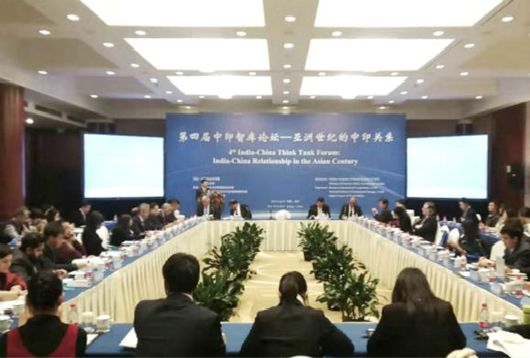Forum calls for deepening China-India ties
Author:Zhao Nihong Source: Chinese Social Sciences Today 2019-12-13
The 4th China-India think tank forum in Beijing Photo: CHINANEWS.COM
At the 4th China-India think tank forum in late November in Beijing, more than 150 experts and scholars from China and India discussed how to deepen bilateral ties.
At the opening ceremony of the forum, Xie Fuzhan, president of the Chinese Academy of Social Sciences (CASS), pointed out that the world today has entered a new period of great development, significant changes and major adjustments. China and India, as important developing countries and emerging markets, are important forces in the process of world multipolarization.
Xie suggested that the two countries strengthen strategic cooperation to maintain global stability and development; strengthen pragmatic cooperation to inject a strong impetus for the common development of the two countries; enhance exchange between academia and think tanks; and encourage learning from each other’s development experience.
In his speech, Chinese Vice Foreign Minister Luo Zhaohui said that the simultaneous rise of China and India is the most significant historical event of the 21st century. The two sides should go beyond their way of managing differences, break the vicious circle of volatile bilateral relations, and strengthen bilateral and multilateral cooperation. The two should work toward more cooperation and fewer differences, and they should explore more avenues for major countries’ peaceful coexistence and common development.
Luo mentioned that the India-China Think Tank Forum is the highest-level and largest institutionalized platform for think-tank exchange between China and India, which is of great significance for enhancing mutual understanding and cooperation between the two countries.
In light of the world economy’s weak growth and recovery, China and India should strengthen cooperation under bilateral and multilateral frameworks, establish multi-dimensional cooperative partnerships, and promote global economic development, said T.C.A. Raghavan, director general of the Indian Council of World Affairs.
Currently, emerging markets and developing countries are experiencing a collective rise, contributing 80% of the world’s economic growth. China and India are the largest developing countries in the world, and they are also the only two countries with populations of over one billion. The two countries share common positions and development issues.
On how to strengthen cooperation between the two countries, Zhu Cuiping, a professor at Yunnan University of Finance and Economics, said that trade cooperation depends on the economic foundation, comparative advantage, comparative competitiveness and stage of economic development. There is tremendous potential and demand for China-India economic cooperation, but there is a huge gap between reality and potential, and a lack of actual action. More diversified investments are needed to resolve the trade imbalance between China and India.
China and India could cooperate in three areas: small- and medium-sized enterprises, the knowledge economy, and environmental issues, said Gunjan Singh, a research fellow at the Indian Council of World Affairs. Drawing on China’s experience of successful market liberalization, India can develop a series of policies accustomed to India’s circumstances and needs. The two countries can sign more agreements on technological innovation and increase cooperation in the environmental field to benefit each other.
At the level of the international order, China and India should also strengthen cooperation. At present, the international order is facing the risk of disorder. Ye Hailin, deputy director of the National Institute of International Strategy at CASS, said that China and India cannot merely rely on technology to make changes. They should have more courage to integrate their ideas into the current world order.
This article was edited and translated from CHINANEWS.COM.

